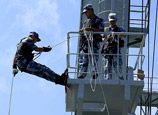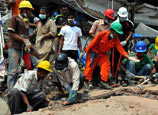
"Children easily get bored and tired and so can adults after sitting in the same position for too long.
"But in a camper, you can sit on a sofa, drink freshly brewed coffee, go to the restroom and change diapers. You can even take a shower," added Wang.
"Imagine trying any of those in a normal car.
"Traveling by camper is fun, no matter the distance."
Wang says most of the camper-owners he knows are 35 to 50-year-old, successful people who come from all walks of life.
He sums up the typical camper driver as a "rich second-generation dad" who would consider buying a fast sports car a waste of money.
Another interesting feature, and less expected one, of life in a camper is that it can help facilitate communication between family members, Wang adds.
"Modern life is filled with so much hustle and bustle, many couples and families can go days without bothering to speak to each other," he said.
But life on the road means there is no excuse not to talk, given you are living under a far smaller roof, "with different wonderful views outside, maybe even some birds chirping", he adds.
"Life is everywhere around you, you know," he laughs.
According to Wang, 80 percent of campers are used by families for household outings.
"The camper industry went through explosive growth in 2011, and there's no reason to doubt that pace of growth will continue over the next two or three years," he says.
According to Beijing Recreational Vehicle Center, camper numbers in China reached 10,000 at the end of last year, compared to 6.5 million, 9.6 million and 80,000 in Europe, the United States and Japan respectively.
There are many more campsites too in those markets.
In the 2009 document, Opinions of the State Council on Accelerating the Development of Tourism Industry, campers were listed as among the country's more potentially popular leisure items of the future, as the population continues to increase their personal spending.
In the Outline of National Tourism and Leisure (2013-2020), published in February this year, the General Office of the State Council underlined that construction of campsites would receive government support.
At the end of 2012, the local governments of Jiangsu, Zhejiang, Anhui and Shanghai signed a Yangtze River Delta region camper travel outline, which detailed five ideal routes for camper travel, with two more now being planned.
The outline also highlighted that a network of 250 camper service stations will be established by the end of 2020 in the regions, by which time there will be 400 to 500 campsites.
"At present, there are more camper users in the northern part of China than in the south," said Wang.
"In the south, people can easily access green open spaces without the need for a camper — there might even be some outside their backdoors.
"But in the north, due to weather conditions, people have fewer chances to enjoy the outdoors," he said, adding that the Yangtze Delta region is particularly enjoyed by camper owners from all over the country.
 |  |
















 Children in quake-hit areas in Sichuan
Children in quake-hit areas in Sichuan


![]()
